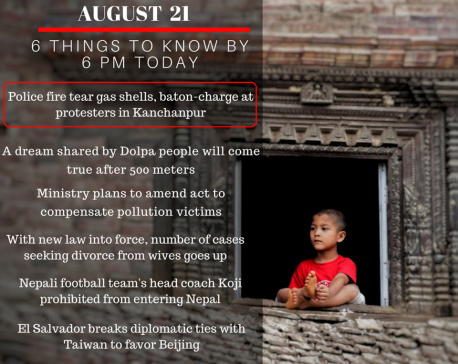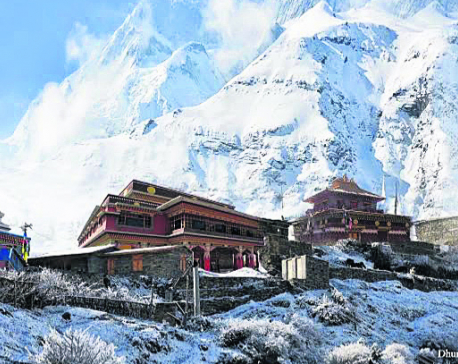
OR
COMMENTARY: Conservative and unaccountable leadership stagnating Nepal
Published On: November 19, 2016 12:39 PM NPT By: Republica | @RepublicaNepal
KATHMANDU: Doling out cash from the state coffers accumulated with the tax payers' money to party leaders and cadres continues to remain a norm for every leadership that runs the government in one of the poorest countries in the world, i.e. Nepal.
It no longer remains a secret in today’s digitalized world where decisions taken inside the boardroom of the Prime Minister are known to the outside world even before they are put into official papers. But then one would wonder why the leaders take a decision that is not only unjustified but also certain to lead to a backlash for them from all quarters, including their own party.
As the saying goes, if you repeat a mistake, it no longer remains the same but would be counted as negligence. But Nepali leaders continue to repeat one mistake after another, i.e. they are becoming more negligent by the day. But why?
The leaders have had enough of negative criticism after deciding to grant Rs. 6 million to former President Dr Ram Baran Yadav for treatment of his prostate cancer in the US. This was also the second time that Dr Yadav had received a share from the state coffers to help increase his longevity. Prior to this, then a sitting President, Dr Yadav was flown to Japan with the state bearing all the expenses for his medical check-up.
But with faint memories of this act that invited lot of criticism from the public, the present government leadership has again repeated the act of doling out funds from the state treasury to Nepali Congress leader Sujata Koirala for her treatment of breast cancer. The government however decided to release only fifty per cent of the straightforward demand for Rs. 10 million to her. And this happened just when
Health Minister Gagan Thapa was about to table before the Cabinet a regulation that would grant a maximum of Rs. 1.5 million as funds from the state for medical treatment of the political leaders.
There were many reasons behind this generous act of the government to dole out funds to ailing and ageing leaders coming into harsh criticism of the public. And the foremost of them was the fact that many Nepali citizens are dying every day for want of a skilled health technician or for lack of simple and minor drug like cetamol.
Every other day, there is a news report saying that an expecting mother died of excessive bleeding, just because she could not be taken to a well-equipped medical centre on time.
And there are also reports saying many families have lost all what they have and become penniless in trying to save their loved ones from killer diseases. Given this backdrop, public at large were furious to see the government handing out cheque worth millions to leaders who could have easily afforded the treatment.
Furthermore, in many cases, all those treatments that the leaders opted for in a foreign land could have been possible with a quarter of the cost inside the country itself.
But what if the public is angry, what if the social media as well as the traditional media are abuzz with the negative backlash that the controversial and unjustified decisions have invited. The leaders seem to be least bothered, now that they are resilient to all such criticism for they know it would not have any kind of impact for them in the future.
The same leaders will continue to be elected in the next general or provincial elections. And even if they are not directly elected, they will use the proportional representation system of elections to make their way to the parliament, and subsequently to the government. And they are always confident that sooner or later they will be elected to the parliament and then to the government, as the voters will have no choice because almost every leader is or turns out to be the same.
Hence, the reason behind the leaders not hesitating even slightly before deciding to release millions of rupees to party cadres and leaders in the name of medical treatment is utter disregard for accountability. The saying that we got rid of one king but then gave birth to many kings seems to be true, given the lifestyle our senior leaders are leading and the expenses that they are incurring to the state in one pretext or the other.
The role of the opposition in the parliament is to play the role of a watchdog over the government and stop it from acting against the interest of the country and people. But in Nepal, the opposition and the government play ‘cat and mouse’ as every other year, the government side becomes the opposition and the opposition the government. And they have been employing the strategy of ‘you scratch my back and I will scratch yours’ to come together to introduce policies that benefit themselves and keep mum whenever a decision such as this one to hand over a handsome cheque to a well-off leader is taken for they know they can do the same or have done the same in the past.
Hence, for now there seems to be no way to stop the conservative and short-sighted leaders from stagnating our country from much needed economic progress and development, unless the second or third rung leaders of the political parties stand up to their leaders, and say ‘enough is enough’. RSS
You May Like This

Aug 21: 6 things to know by 6 PM
Your daily dose of missed important news of the day. ... Read More...

Dhurmus, Suntali to build ‘a Nepal within Nepal’
KATHMANDU, June 5: After successfully completing three settlement projects for earthquake victims and other communities, the actor couple Sitaram Kattel (Dhurmus)... Read More...

SCOPE Nepal provides foil blankets to Nepal Army
KATHMANDU, Jan: SCOPE Nepal, an NGO working in peace, security, environment and social justice, handed over 378 emergency foil blankets to... Read More...






Just In
- Challenges Confronting the New Coalition
- NRB introduces cautiously flexible measures to address ongoing slowdown in various economic sectors
- Forced Covid-19 cremations: is it too late for redemption?
- NRB to provide collateral-free loans to foreign employment seekers
- NEB to publish Grade 12 results next week
- Body handover begins; Relatives remain dissatisfied with insurance, compensation amount
- NC defers its plan to join Koshi govt
- NRB to review microfinance loan interest rate











Leave A Comment